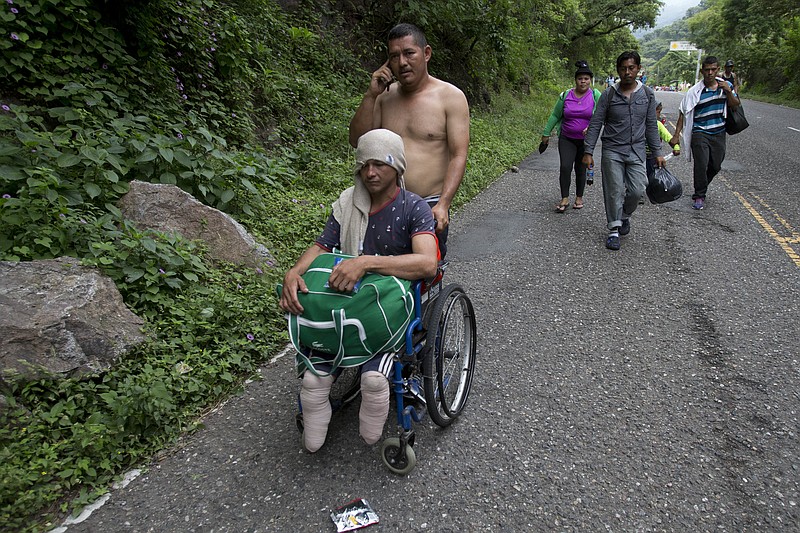ESQUIPULAS, Guatemala (AP) — U.S. President Donald Trump threatened Tuesday to cut aid to Honduras if it doesn’t stop a caravan of some 2,000 migrants, even as they resumed their northward trek through Guatemala with hopes of reaching the U.S. border.
Despite having walked all day Monday with swollen, blistered and aching feet, the group rose shortly after sunrise from sleeping on the ground in their clothes.
Dozens attended Mass at the basilica in Esquipulas, a city just across the border from Honduras and about 90 miles east of Guatemala City. The migrants then resumed their journey escorted by Guatemalan police.
The group’s numbers have snowballed since about 160 migrants departed Friday from the Honduran city of San Pedro Sula, with many people joining spontaneously carrying just a few belongings. A Guatemalan priest estimated more than 2,000 were fed at three shelters run by the Roman Catholic Church.
Three weeks before midterm elections in the United States, the caravan elicited a tough response from Trump.
“The United States has strongly informed the President of Honduras that if the large Caravan of people heading to the U.S. is not stopped and brought back to Honduras, no more money or aid will be given to Honduras, effective immediately,” Trump tweeted.
However, the Central American nation’s ability to do anything appeared limited as the migrants already crossed into Guatemala on Monday, twice pushing past outnumbered police sent to stop them — first at the border and then at a roadblock outside Esquipulas.
Trump did not follow through on a similar threat to the Central American nation in April over an earlier caravan, which eventually petered out in Mexico.
In a statement, Honduras’ Foreign Ministry accused unidentified “political sectors” of organizing the caravan with “false promises” of a transit visa through Mexico and the opportunity to seek asylum in the United States.
It urged the migrants not to let themselves “be used by a movement that is obviously political and seeks to upset governability, stability and peace in Honduras and the United States.”
Meanwhile, Mexico’s immigration authority sent out a fresh warning late Monday that only those who meet entry requirements would be allowed into the country and each migrant would have to satisfy Mexican migration agents. Hondurans need visas to visit Mexico in most cases.
Still, it remains unclear if Mexico and other governments in the region — many of whose own people are migrants — have the political will to physically halt the determined border-crossers, who are fleeing widespread poverty and violence in one of the world’s most murderous countries.
“In Honduras there are no jobs, and the jobs that do exist aren’t enough to live on,” said Jose Francisco Hernandez, a 32-year-old from Copan state in western Honduras. “We can’t go to the city because it is full of gang members, and that is hurting us. We decided to migrate from the country to see if we can find a better life.”
Carlos Reyes, 20, said he was attacked a week ago for being gay and dressing in women’s clothing.
“Some men were going to kill me. … They wanted to kill me for who I am,” Reyes said.
The migrants hope that traveling en masse affords them protection from robbery, assault and other dangers that plague the journey north.
Many carried only a few belongings in backpacks and bottles of water. Some pushed strollers or carried toddlers on their shoulders. As the day wore on, the crowd splintered into smaller groups as some walked faster and others fell behind.
Nery Jose Maldonado Tejada, a 29-year-old from San Pedro Sula, said he lost both feet in a June 2015 freight train accident in Mexico while trying to make it to the United States.
On Tuesday, he was being pushed in a wheelchair by a friend, his lower legs wrapped in bandages and a green duffel bag on his lap. He was intent on making it to the U.S. this time, he said.
“I know that there they can put a prosthesis on my feet, and I will be able to walk,” Tejada said. “And to work, because my hands are still good.”

